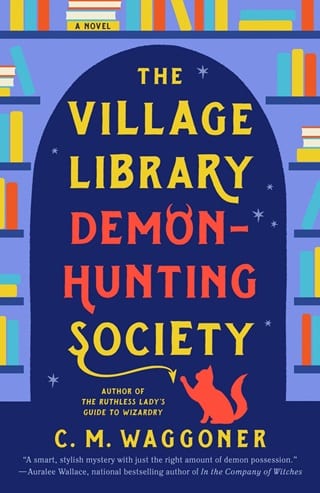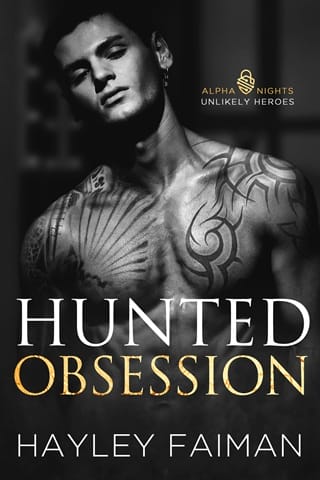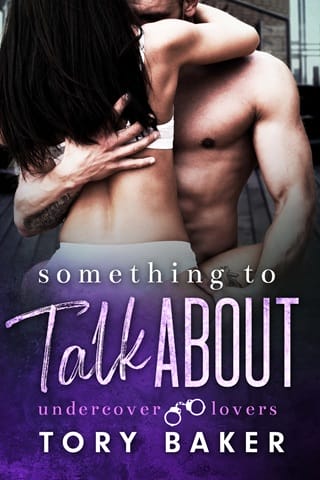Chapter Twenty-Five
Twenty-five
"I think that you're very likely to find Corey Thompson's fingerprints on the bags," Sherry said.
"Mom—" Corey started. His mother squeezed his wrist again.
"Not until you have a lawyer with you," she said, and fixed Sherry with her cool blue stare. "That's drug trafficking," she said. "Not a murder."
"I know," Sherry said. "I'm getting to the murder bit." Then she winced. That had sounded incredibly insensitive. "Sorry," she said, and then quickly moved on. "Alan was suspicious of what was going on in his shop, and he had a substantial amount of cocaine hidden in a picture frame hanging on his living room wall. I don't think that he'd found the drugs, but I also think that it would have seemed like a ticking bomb to the men involved in the scheme. Any one of them would have had a strong motivation to go see Alan that night to try to shut him up permanently." She regretted that turn of phrase as soon as she said it. It was hackneyed. She cleared her throat. "Which of them could have done it? Of the three of them, Mr. Kaminski is the one with the strongest and most obvious alibi. He was in Manhattan that evening, enjoying scotch and cigars with six other men. There are photos of them together, the cigar lounge confirmed that he was there that night, and he happily sent me copies of his receipts. So much for Mr. Kaminski.
"What about Todd McCarthy? He doesn't seem to have a clear alibi for that night on first glance. He was, in fact, one of my top suspects, until I heard that Father Barry has been spending lots of time with wealthy old ladies late into the evenings recently."
Father Barry practically jolted out of his chair. " What? I didn't—"
Sherry interrupted him. "Father, did you receive a message from Mrs. Walker or her assistant, Karen, recently?"
He blinked, then nodded. "A few weeks ago, I think. I'd gone to visit with her a few times, then one day I got a letter saying that she wouldn't be able to see visitors for a while because her health had taken a turn for the worse, and that she'd call if anything changed. I thought it was a little strange when the whole point is for me to minister to the sick, but I didn't want to be pushy."
"I thought it might have been something like that," Sherry said. "At first, I took it at face value as slightly odd behavior for a priest. Then I met Barry's twin, and I heard that Father Barry had been at a very rich old lady's house until nearly midnight on the night Alan was killed. Just before I heard this, Father Barry himself mentioned to me that he'd been up late that night feverishly trying to finish writing a homily for the next morning. I suspect that the person visiting Mrs. Walker that night was, in fact, Todd, and that his alibi for Alan's murder is that he was too busy trying to defraud an old lady at the time to be the person responsible."
" Todd ," Barry said.
Todd laughed. It was a small, muted laugh, but still definitely a laugh. "Sorry," he said, and straightened in his chair. He was still twinkling a little around the eyes. "I was with Mrs. Walker that night," he said. "Barry had complained about her to me before, so I thought it would be fun to take over from him and do a little ministering of my own. She had a great time. It's not illegal to pretend to be your twin brother as a prank when all you do is cheer up a lonely old hypochondriac for a few hours."
"Hm," Sherry said. She didn't really know what else to say. He was, as far as she knew, technically correct. Impersonating a police officer was a crime: impersonating a priest was not. "And you can prove that you were at Mrs. Walker's house all evening?"
"You can always ask her," he said. "Ask her if she told Father Barry a story about pretending she didn't recognize Truman Capote at a party in 1976. Actually, ask her to tell you the whole story. It's a good one."
"I'll do that," Sherry said, aiming for severity and possibly missing. Todd had a terrible history of taking advantage of people who'd been taken in by his charm, but the charm itself was fairly hard to deny. "That's two of the three eliminated, then. The one man involved in the little drug ring who doesn't have an alibi is also the one man most closely linked to both Alan and the crimes, who would have the most to lose, and who Alan would allow into his home without hesitation at any time of the day or night." She looked straight at Corey then, and waited.
Corey had gone very, very pale. His mother was gripping his arm again. "We're leaving," she said, moving as if to stand up. "And calling our lawyer."
"I wouldn't leave just yet," Sherry said. She was surprised by how firmly she said it. It came out confidently enough that Susan sat firmly back down in her seat as if she'd been admonished by the teacher.
"Corey doesn't have an alibi," Sherry said. "On the other hand, there's no evidence that he was in his father's house that night at all. In fact, there's a very major piece of evidence that suggests that he wasn't there, and it's the same piece of evidence that's made his involvement in his little drug ring so obvious." She pointed across the table to the picture frame. "He was the person who framed that picture. Anyone who knew Alan well would have known that: Alan was very proud of what a craftsman Corey had turned out to be. If, at any point, someone discovered the cocaine packed into the back, it would be very obvious who was responsible. So why on earth would Corey kill his father in order to cover up his own involvement in a drug ring, but leave behind the piece of evidence that would have motivated the killing in the first place? To say nothing of all of that cocaine. It doesn't make any sense."
The entire room jolted slightly in their seats when quiet, responsible Eli Thompson slammed his hand down onto the table.
"That's enough ," he said, and then took a deep breath. "I'm sorry, Miss Pinkwhistle. But this has been a really hard week for our family. I need you to get to the point."
Sherry's cheeks heated. "I was getting there," she said, and took a second to collect herself before carrying on. "As I was saying. It wouldn't make any sense for Corey to leave that picture behind—or, at least, to leave the cocaine inside of it. That bothered me, when I went back to Alan's house today. There were actually two other things that also bothered me when I went back to look at the crime scene again with all of my suspects firmly in mind. One thing that was missing, and two things that were there and shouldn't have been." She ticked them off on her fingers. "Missing: the financial records from Alan's shop that he said that he'd wanted to go over that night. Present: a pair of skis, with no ski boots to fit them, and a picture with hundreds of dollars' worth of cocaine stuffed into the frame."
Everyone in the room was staring blankly at her. She soldiered onward. "The missing books weren't taken away by the police, and Alan himself had planned on working on them that night. Either he hid them away because he was worried about someone taking them, or someone did take them. Why would someone take the books away? Presumably because they contained information that would look bad for the person who took them. Corey might fit there: all of those fake art sales would have been recorded. But how about those skis?"
Sherry stood up then. She hadn't planned on it. She was just too full of nervous energy to sit any longer. "Those skis bothered me. They didn't fit Alan's ski boots, and Alan was a very tidy, organized kind of guy. Everything in its place. When guests left things behind at his house, he'd stick little notes onto them to remind himself who they belonged to and that he needed to return them. So why was there a pair of skis in his porch with no ski boots to fit them? The answer, I think, makes all three of those puzzling objects fit into one story." She put her hands onto the table to try to stop them from shaking. "Alice Murdoch killed Alan Thompson, and it was partially my fault."
There was a wave of noise from the gathered crowd: it crested quickly, then subsided just as fast, leaving the room in complete silence. Sherry started to pace now, her words coming faster. "Everyone in this room thinks of themselves as the protagonist of their own story. I'm no exception. I'd been thinking of myself as the hero of this show, as the detective main character, and so I didn't manage to really think about how things that I'd seen from my perspective could have looked very different from across the street.
"Here's what I think happened. Alice had been short of money for a long time. She worked long hours at the antiques shop, but she still barely made enough to cover her bare essentials every month. She knew that Alan was well off, and she knew that he was careless about keeping track of the finances for the shop. She probably felt a little resentful. Why should Alan live the high life off of her labor while she was practically drowning? She started to steal from the register. Not much, I don't think. Ten or twenty dollars here or there. Maybe she'd tell Alan that a customer had haggled for a discount, or that someone had handed her a ten instead of a fifty, but I think that she usually just fudged the math a little when she cashed out in the evenings. She probably got away with it for a while, until Alan started acting more interested in the books than he'd been before.
"That would have made her anxious. She would have worried that she was about to be fired, which would have impacted her behavior. Alan definitely noticed something: on the day he died he spoke to her about how she'd seemed distracted at work. I think that he might have already known that she'd been stealing a few dollars here or there, and that was his way of gently warning her that she needed to cut it out. That would have been like him. He was a very gentle, nonconfrontational man. Besides, he had much bigger problems to worry about: he was trying to figure out if his son had gotten his business mixed up in a full-on criminal enterprise. Alice's petty theft would have seemed like a pretty minor issue in comparison, and he'd want to give her the chance to quietly clean up her act before he'd consider firing her or getting the police involved.
"If that is what he was trying to communicate to her, then it would have gone over her head. Alice Murdoch isn't a young woman who's had much experience with gentle, forgiving, indirect men. She's someone who's always on high alert for danger. That's where I came in. That night, when I came by to give her the leftovers from my dinner with Alan, I mentioned how he'd been poring over the books. I only said it because I was gushing about my evening and how sorry I felt for poor Alan having to work late. Alice heard it as a threat. She was the protagonist to her own story: it never would have occurred to her that Alan could be concerned about something more important than her stealing cash from the register. She didn't know anything about Corey and Todd and their little upstate cocaine ring. She just panicked, thinking that she might be about to lose her job, and decided she needed to get to Alan to talk to him before he really dug into the books and realized that her math errors were always in the same direction.
"Here's another point where I failed to think beyond my own perspective. Alice and I provided each other's alibis that night. Neither of us own cars, and I knew for a fact that there was absolutely no way that I could have gotten down to Alan's and back in a blizzard within that two-hour window. What I completely failed to do is consider the fact that Alice isn't me . I'd seen skis in her front porch, but they'd been mixed up with all sorts of other things that I thought were just pieces of junk she'd accumulated. I don't know how to ski, and I was in the habit of thinking of Alice as this sort of hapless young thing who needed my help with everything. It didn't occur to me that she might be very good at something that I couldn't do at all. She is, though. I did a little digging into her background this afternoon and found some pictures of her in high school, working as an instructor for children at a ski resort."
Sherry stopped pacing then and turned to face her audience again. "From there, it's simple. Alice skied down the hill to Alan's house to talk to him. It would have taken a fraction of the time it would have taken her to walk: maybe only five minutes or so. He invited her in and made her tea, which is exactly the sort of thing that you would do for Alice if she showed up at your house seeming agitated late at night. She was probably pacing around the living room, trying to figure out what she should say to keep her job. He came in with the tea and said something that spooked her. Maybe something about how he was going to have to talk to the police soon. Alan was the protagonist of his story, as well. He was so wrapped up in thinking about Corey that it wouldn't occur to him that she might think he was threatening her . Whatever he said or did, as he was leaning over with the tea, she grabbed a brass table lamp and hit him on the back of the head."
Susan Thompson made a small, wounded sound. Sherry swallowed and pressed on. "She probably didn't mean to kill him. She was probably shocked. She thought quickly, though. She grabbed the account books but left the picture full of cocaine on the wall: she would have had no idea that there was anything special about it. She couldn't ski back up the hill again, and carrying the skis back would have slowed her down and made her look suspicious if anyone saw her, so she put her skis with Alan's so that they blended right in. Then she hurried back up the hill to her house, where she deliberately blew the power out so she'd have an excuse to come over to my house and establish an alibi."
"I didn't," Alice said. Her voice was small and wavering, but she spoke up, anyway. "I didn't do any of that. You just made it all up. Just because you saw some random skis, and you can't find some papers from the shop. That's not proof."
"She's right," Sheriff Brown said. "If it happened like you said, then she's had days to dump the evidence."
"I've thought about that, yes," Sherry said. "But there's a problem. Where would Alice dispose of the evidence? The accounts from the shop could be burned at the kitchen stove, maybe, but then there's the ski boots. She couldn't exactly flush them down the toilet. Tossing them into the woods somewhere risks them getting found."
"Just throw them away," Sheriff Brown said. "They could be under a foot of trash in the landfill by now."
"You'd think so," Sherry said. "But this is Winesap. There aren't sanitation workers who come to take the garbage away," she added, for the benefit of the city people present. "You have to drive your trash to the landfill on your own. The problem for me and Alice is that neither of us has a car, so we have to get someone else to do it. I have a guy who I'd hired to take mine away once a week, and when Alice arrived, I just paid him extra to start picking hers up as well. Normally he'd actually have come to get our garbage right about now."
"But now?" Sheriff Brown asked.
She allowed herself a small smile. "I called an hour ago to cancel the pickup. If Alice tried to throw those boots away, they should still be in a garbage bag sitting next to her mailbox."
Alice gave a small, despairing groan and buried her face in her hands. " Sherry ," she said. " I thought that we were friends. "
 Fullepub
Fullepub 



